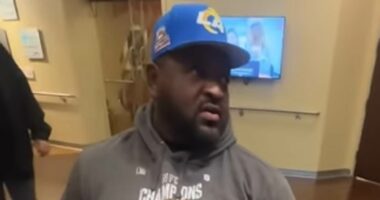Share this @internewscast.com
The announcement sent ripples through Old Trafford, with ‘the guidance’ emerging as the talk of the town.
Ruben Amorim was portrayed in a less than flattering light, described as emotionally immature. Critics painted a vivid picture, likening his profile to a flare cutting through the night sky, highlighting his perceived ‘inexperience’ and ‘inflexibility’.
Yet, Amorim seemed unfazed, captured grinning with his wife, Maria, as they left their Cheshire residence on Monday afternoon. Whether he was aware of the circulating narrative is unclear, but if he was amused by its absurdity, he wasn’t alone in that sentiment.
This brings us to Jason Wilcox and his right-hand man, Omar Berrada—key figures who expertly navigate the shadows, akin to contestants on Channel 4’s Hunted, managing to remain undetected.
The identity of the person behind the post-departure briefing remains a mystery, but it’s likely that Wilcox, United’s sporting director, and Berrada, the chief executive, were in the loop. Their roles demand an acute awareness of such developments within the organization.

We don’t know who sanctioned the briefing after Amorim’s exit but it can be assumed Jason Wilcox (right) and Omar Berrada (centre) would have been aware of its nature

We were all laughing at the farce. Ruben Amorim (left) had said too much, but what about the men who say nothing at all, like director of football Wilcox?
Wilcox and Berrada’s involvement is crucial to this narrative. The laughter surrounding ‘the guidance’ stems from the fact that Amorim was their chosen candidate. They were instrumental in his appointment in November 2024 and consistently supported him throughout his tenure.
‘We’ve just got to continue to build the spirit, continue to build on Ruben’s idea,’ Wilcox told United’s website, as recently as November 5, four days after Amorim’s first anniversary in charge. ‘Ruben has got a very clear idea. It’s a lot more flexible, the idea, than what people give it credit for.’
Anything catch your eye in that paragraph? Yes, of course: Flexible. It couldn’t be more obvious if it was accompanied by a klaxon and had Blackpool’s illuminations wrapped around it. If he was ‘flexible’ 62 days ago, when did United think he had become ‘inflexible’?
Will Wilcox speak to a publication or an outlet rather than a club channel, which is the equivalent of marking your own homework? You’ll be waiting a long time. Sporting directors, in the Premier League, tend to hold the privileged position of never having to face the music and what a nonsense it is.
When Jurgen Klopp arrived at Liverpool a little over 10 years ago, he was puzzled early on as to why he was dealing with all manner of questions: How will the building of the new stand affect your transfer budget? What is happening with these contracts? What do the owners make of certain situations?
Klopp would often be perplexed as to why he had to explain: not because he wanted to be awkward but because he had arrived from Germany where, at Borussia Dortmund, he worked in tandem with Michael Zorc and Hans-Joachim Watzke.
Why, he wondered, must it be so different in England? Even the routine medical bulletins he used to give at Dortmund had to stop.
But it really is different here, to the point it is almost insulting to supporters. Ask Leicester City fans what they think about Jon Rudkin, such a powerful figure at the King Power Stadium, and you will be overwhelmed by the animosity for his apparent aloofness.

Jurgen Klopp would often be perplexed as to why he had to explain big decisions – at Borussia Dortmund, he worked in tandem with Michael Zorc and Hans-Joachim Watzke (left)

Ask Leicester City fans what they think about Jon Rudkin (left), such a powerful figure at the King Power Stadium, and you will be overwhelmed by the animosity for his apparent aloofness
Rudkin, in fairness, never spoke when Leicester won the Premier League, the FA Cup and Community Shield in five golden years from 2016 to 2021, but he hasn’t spoken in the subsequent years when there have been relegations and managers have been burnt through quicker than Roman candles on Bonfire Night.
He would be well-placed to explain the combustion and why signings have failed or what the plan is going forward but he doesn’t give interviews. And, as such, the wall of silence simply gives the impression that he is in a gilded position, protected from any flak.
We can go on. Last week, Enzo Maresca left Chelsea – a club with, count them, five sporting directors. The reason they have five is because they don’t want a single person holding all the power. You’d think if you had five, however, one of them would be able to speak.
Alas, Maresca stormed out of his position without a word from above. Yet, of course, plenty of messaging seeped out about how he had caused unhappiness by going off message in press conferences, among other things. If people who hold power are unhappy, shouldn’t they really be prepared to go on record?
There is a similar feeling among a growing section of Liverpool fans, who are eager to hear from Richard Hughes after one of the most turbulent periods in the club’s history.
What was the strategy last summer? Why did the champions leave behind the old formula of buying smartly and do something totally different?
It would make fascinating – and enlightening – reading or viewing. It would also take away some of the enormous burden that Arne Slot has carried.
Perhaps it will happen before the end of the season or, like so many in his position, perhaps Hughes is destined to remain out of sight.

Chelsea have five sporting directors – including Laurence Stewart (centre) and Paul Winstanley (right) because they don’t want a single person holding all the power

There is frustration among Liverpool fans, who are eager to hear from Richard Hughes (right) after one of the most turbulent periods in the club’s history
If that is the case, it is wrong. The modern phenomenon that is the social media frenzy around the transfer window routinely sees sporting directors anointed by supporters when a player gets signed that a group of fans really want.
Sure, they will enjoy the adulation of completing a deal but the role of a sporting director is more complex – it’s about ensuring the right people are in the right positions, from those who look after travel to the medical department to every last detail in between.
When sporting directors carry that authority, there should be recognition that when tough times come, they should place themselves front and centre to deal with the turbulence.
Staying hidden away merely indicates they are living charmed lives.













